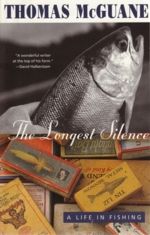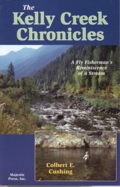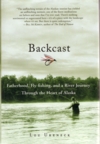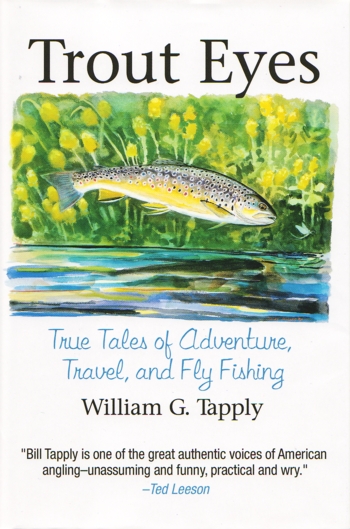Books on Destinations for Fly Fishing

The Longest Silence: A Life in Fishing
by Thomas McGuaneEdition: Paperback
Essays on fly-fishing have been written and will continue to be written, but McGuane's work likely represents the apex of the category. If somebody or some new collection of work proves me wrong, then so be it. In my mind, page for page and word for word, The Longest Silence will reign! No arguing McGuane as the master wordsmith, right? Now, combine that quality with a grand sense of humor and keen insights into the sport and you have something special. We'll be lucky to see another book of it's equal in this generation. (There, I said it.)
Rather than give you a "macro" review, I'll cover my favorite essays of this book in sort of a micro-review fashion:
Back in Ireland - is as pointed and sharp as a tack. The story is as much about a time as it is about a place. McGuane reminds us that the intersection of time and space is unique as a snowflake hitting the warm ground.
Twlight in the Buffalo Paddock - McGuane takes us into a seemingly sterile (e.g., there's no fish in those casting ponds) and off-beat, urban setting in San Francisco's Golden Gate Park. He points out the art as well as the pointlessness of false casting to plastic-ringed targets at a time when fly fishing is being passed up by faster, more extreme sports like skateboarding and BMX. But even in this setting, McGuane finds his perfect moment. It's a moment that draws many fly anglers back to their sport: "The ponds have gone silver. The emptiness around the few members who remain seems to make their casting more singular, more eloquent."
Henry's Fork - The author fishes the Henry's Fork of the Snake River with guide Mike Lawson. The essay turns into a bit of a rant with McGuane calling Idaho's Department of Fish and Game to the carpet. And like the metaphoric bad-dog, rubbing their nose in a big pile of silt they left in the river.
World-Record Dinner - reads like a minor treatise on fly fishing the flats for mutton snapper. The mutton snapper as McGuane describes it -"not at all handsome, with its large and vacant-looking head" - earns more than respect - "difficult to deceive and very spooky" as an angler's quarry.
The Sea-Run Fish - is the most sharply pointed satire of the book, with a laser-like focus on an entire ontology of misdirected fly anglers. McGuane breaks them down into: The Rich, Old and New, Corporate Groups, Time Sharers, Spongers (which he claims membership to), and The Poacher. With some amount of after thought, he includes Steelheaders ("The first group, distinctly, are the original California steelheaders emanating from the Bay Area."), lodge denizens, and the roaming sponge.
I loved his take on fishing lodges: "The lodge has the unenviable job of maintaining living facilities, waterborne transport, and guides, as well as some level of communications and emergency medical capability in remote places. The logistics underlying this can resemble what in military parlance is called a task force, but it enables one to arrive with clothes and tackle only, and depart with no responsibilities for maintenance and other ordeals of the off-season, a real luxury. The downside is that it's not cheap and you never know who you'll be bunking with.... and if you travel long enough to so-called destination angling, you will meet some unparalleled Twinkies and monsters."
I could go on citing stories and pulling quotes from this book. But, instead I'll finish with 3 words of advice - get his book.

The Kelly Creek Chronicles
by Colbert E. CushingEdition: Paperback
A stream ecologist takes up fly fishing here. And in this 80 page book, the author strikes out for Kelly Creek in Idaho. For the better part of 15 years "Cush" makes an annual pilgrimage to a remote stretch of creek in the Clearwater National Forest.
Each year's trip varies primarily in weather and numbers of trout caught. Get this - a ten to twenty fish day is considered "slow" for these guys. The cast of anglers changes slightly from trip to trip. Cush brings work colleagues, in-laws, the wife and his son. The latter years chronicled have a similar rhythm and become predictable, but thankfully its a quick read.
You have to admire Cush's connection with this water to return year after year regardless of weather or car problems. What I admire most about Cush though is his simple, basic approach. He fishes a Royal Wulff almost exclusively and doesn't go beyond a can of spaghetti for dinner. As you read the Kelly Creek Chronicles you come to realize the recipe for success on this remote creek is pretty simple.

Backcast: Fatherhood, Fly-Fishing, and a River Journey Through the Heart of Alaska
by Lou UreneckEdition: Hardcover
The author invites you to come along on a rafting / fly fishing trip down Alaska's Kanektok River. There's excitement in the air in the opening chapter as the author and his teenage son hop planes from Philly to Anchorage then to Dillingham and finally dropped by bush-plane into the Alaskan wilderness - ON THEIR OWN. To dial up the adventure meter here, the East coast duo decides to cover the 100 plus mile float by themselves. Add to that a shoe-string budget for equipment and a first time ever trip to the wilds of Alaska, and well, I sensed it would be interesting.
And yes, these guys experience the thrills and dangers of the untamed Alaskan wilderness first-hand. But the greater adventure Lou Ureneck has in mind for us in Backcast isn't catching wild silver salmon on a fly-rod, but the adventure of growing up, becoming a man, and the demands of being a good father.
Backcast alternates settings between Alaskan wilderness and Ureneck's various homes which range from South Jersey up north to Maine. At least a third to a half of the book tells Ureneck's life story. How he grew up. The importance he places on fishing as an escape from an unstable family life and as a common bond with his step-father. And lastly, living through the stress and anguish of a crumbling marriage.
Ureneck vows to not repeat the mistakes of his natural father and his step-father. As the story closes, we are presented with a father who has made tough choices but refuses to throw in the towel on his son. The struggle here to maintain the love and respect of his college-bound son, is no less in scope to what it takes to survive the raw, Alaskan wilderness. At the end of Backcast, I'm left feeling that his father is certainly up to the task.
Ureneck delivers a well-told, and extremely personal story of a man's journey to confront a childhood filled with temporary homes and temporary father figures. The struggle against the Alaskan elements sometimes pale in comparison.

Trout Eyes: True Tales of Adventure, Travel, and Fly-Fishing
by William G. TapplyEdition: Hardcover
The qualities of Bill Tapply's work which jump out are: (1) the craftsmanship of his writing - first class, and (2) the universal themes anglers have grown to know and love. Bill describes settings which transport our minds to the beloved dream-world of casting a dry fly to a large feeding brown trout. And he transports us from our real world of suburban sprawl and traffic jams to our favorite escapes faster than 2 large aspirin.
The stories he tells in Trout Eyes, especially of his youth, embody a Norman Rockwell quality. A certain purity and innocence of a time past as rendered in this passage: "As the winter nights passed, his boxes filled with flies. When I was a kid, there were very few evenings when Dad didn't put in an hour or two at the vise. And if I sat there quietly and waited long enough, he'd eventually pat his knee and invite me to climb up and time a fly or my own." A boy sitting on his father's knee at the tying vise paints a classic image of the fishing tradition - knowledge being passed down from father to son.
Trout Eyes isn't just about trout either. One moment we are at the tying vise, the next Bill is covering the technical aspects of tippet material in the "X Factor." If forced to pick from the various stories that comprise this book, my favorite short story would be "Thinkin' Mean." The story appeals to me on a couple of levels. First, as a long-time fly fisherman, I can relate to the hard won knowledge that it makes to master a complex mayfly hatch on water like the Willowemoc. But more importantly, it's a story about one of the golden rules we as anglers should live by. (By the way, there's a least three other unwritten golden rules for angling.) And this golden rule is simple: to share your knowledge and insight with others (a.k.a. the secret fly). So, Bill if we should ever share the same water and I mange to hook all the fish, I'll be sure to throw a "Cigarette fly" your way.
 Being, Nothingness, and Fly Fishing: How One Man Gave Up Everything to Fish the Fabled Waters of the West
Being, Nothingness, and Fly Fishing: How One Man Gave Up Everything to Fish the Fabled Waters of the West by Michael Checchio
Edition: Hardcover
4 of 4 people found the following review helpful:
This book accompanied me over the Christmas holiday, and proved to be an excellent read. The author's passion for flyfishing is evident thoughout the text. Flyfishing, however, is not the only dimension to this book. Michael Checchio also has a keen sense of place, and shares interesting bits of history, people he meets, and natural settings he visited during his flyfishing junket through the Western United States. It reads similar to a travel journal, so it will appeal to readers who want to know more about the western states.
And of course, its biggest appeal will be to those of us with a passion for flyfishing. To that extent, the book can even serve as basic guidebook to fishing places such as Yellowstone, Henry's Fork, and steelhead waters in Northern California and Oregon. Aftering reading the book, you'll understand why the author quit his well-paid job in New Jersy and moved west."

